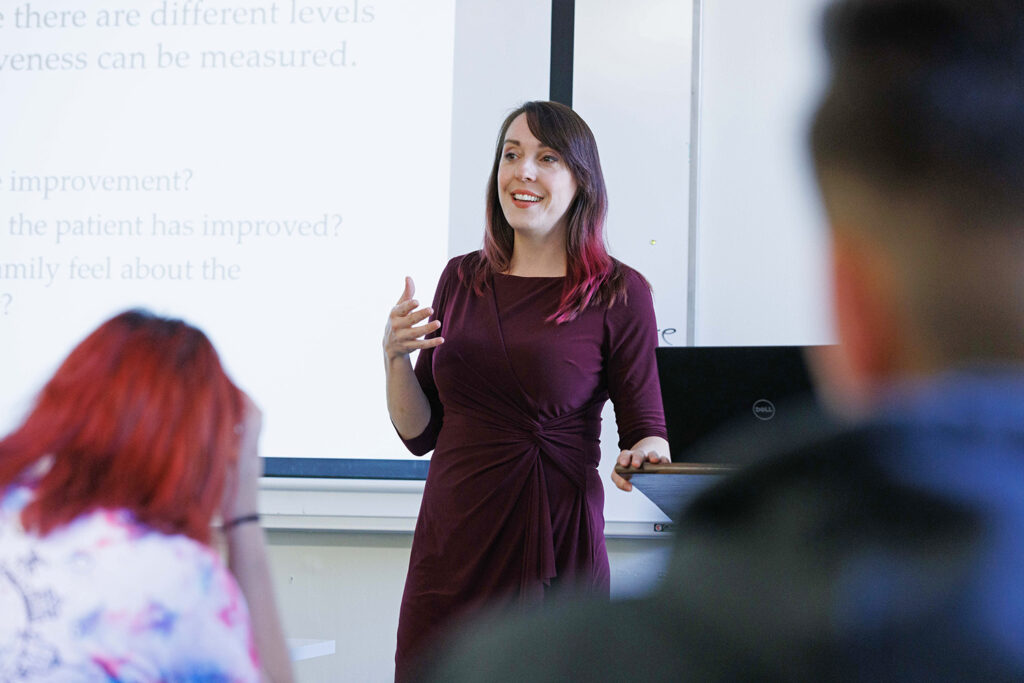Weight Bias in the College Classroom
6/16/2022

Faculty Spotlight: Dr. Alexander’s Call for Inclusive Teaching Practices for Students of All Sizes
“Body size is a diversity issue.”
That thought-provoking statement emerged from a conversation with Katherine Alexander, Ph.D., Associate Professor and Chair of the Psychology Department, who recently published a research study on weight bias in the college classroom. Her findings indicate that college students tend to perceive their overweight peers as having lower GPA’s and, on average, report having less desire to work with large-bodied classmates in a team setting.
The article, “Evidence of Weight Bias in the College Classroom: A Call for Inclusive Teaching Practices for Students of All Sizes,” was published in the September 2021 issue of College Teaching, a peer reviewed journal for educators. The study sheds light on a subtle but powerful bias that has been studied in other environments—for example, in customer service, healthcare, the media, and the workplace—but never before in the college classroom.
Why was it important to study this issue among college students?
“My research agenda focuses on the social psychology of eating behavior and weight,” said Dr. Alexander. “We already know that subtle weight-related bias is prevalent in our society.”
Pointing out glaring evidence of such bias in the popular media—“think of one-dimensional obese characters being the target of ridicule”—the psychology professor and researcher set out to ask how weight-related bias could be even more damaging in a learning environment.
Dr. Alexander and her co-author, Robert G. Alexander, Ph.D., of SUNY Downstate Health Sciences University, devised a survey instrument that asked participants to consider hypothetical situations in their own classrooms.
“We were careful not to do harm, even inadvertently,” she said. By creating hypothetical peers, not only were participants free to respond candidly, but the instrument also ensured “a scientifically sound method that allows us to have more control over the variables.”
Their findings revealed that college students tended to perceive their overweight fellows as having lower GPA than normal-weight students. What’s more, said Dr. Alexander, “participants expressed less desire to work with overweight classmates. As educators, we want every student to feel included so they can have maximum engagement. If we accept that groupwork is a useful classroom tool and that a sense of belonging is important to student success, then weight bias has the potential to be very damaging for students who are ostracized by peers.”
And as the article notes, “Being discriminated against because of one’s weight can lead to debilitating life problems and pathological conditions including stress, depression, and even suicidal behaviors.”
Dr. Alexander, who teaches classes in psychology, social psychology, and group dynamics has talked about the issue with her students. “Students at the Mount are very open-minded, so it surprises them to hear about hidden bias,” she said. “But they’re open to learning more about this and thinking about it in a new way.”
She pointed out that “diversity comes in many forms, and body size is one of them. One reason weight bias persists is that, with all the messages in our culture about dieting and body size, being overweight is perceived to be a controllable stigma. So, when people can’t control their weight, it increases prejudice among those who hold that perception.”
Dr. Alexander expects to continue this line of research and hopes her study will encourage educators “to ensure all students in our classrooms feel included. In the article, I make a call for inclusive teaching practices, such as taking the lead in forming student teams instead of letting students choose up their own teams. Students often feel more comfortable working with their friends, but it’s okay to push students out of their comfort zone. Interacting on a team with people who appear to be different helps them confront the negative stereotypes they’ve acquired.”
Indeed, the journal article cites previous findings that obese and overweight individuals lack a feeling of in-group cohesiveness, and that discrimination in team selection could contribute to this lack. Conversely, the study concludes, “student achievement improves when students feel like they’re a part of their academic community.”
For Professor Alexander, “It’s not just about putting different people together in new groupings. It’s also about learning to listen to others, trying to understand them,” she said. “I tell my students that inclusion is the first step, but it doesn’t stop there. As educators we also need to focus on empathy. That really takes it to the next level.”
About the University of Mount Saint Vincent
Founded in 1847 by the Sisters of Charity, the University of Mount Saint Vincent offers nationally recognized liberal arts education and a select array of professional fields of study on a landmark campus overlooking the Hudson River. Committed to the education of the whole person, and enriched by the unparalleled cultural, educational and career opportunities of New York City, the College equips students with the knowledge, skills and experiences necessary for lives of achievement, professional accomplishment and leadership in the 21st century.
